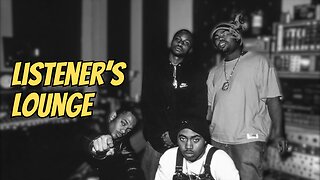Premium Only Content

Where Is My Mind Hey Monkey Gone To Heaven Pixies
Where Is My Mind? Album: Surfer Rosa (1988)
Hey Album: Doolittle (1989) Track 13
Monkey Gone To Heaven Album: Doolittle (1989) Track 7
by Pixies
This disorientation anthem of Where Is My Mind was written by Pixies lead singer Frank Black, who was inspired by a snorkeling adventure. Under water, sometimes the only way to know which way is up is by looking at the air bubbles. Black told Select (October 1997): "That came from me snorkeling in the Caribbean and having this very small fish trying to chase me. I don't know why - I don't know too much about fish behavior."
In an interview with Frank Black, he talked about "Where Is My Mind?" Said Black: "In terms of the content, you don't know where that's going to come. It's such a ricochet, 'pinball wizard' kind of thing - these things bouncing into each other: words, concepts, manic thinking. Half the songs I've written, I had no idea what I was talking about. Certainly, anything that appears into the abstract, I don't know."
Where Is My Mind was used in the last scene of the 1999 mind-bending movie Fight Club, which helped introduce the Pixies to a new audience. Many other TV series and movies have used the song, often when a character is questioning his or her grip on reality. Movies to use it include:
Horns (2013)
Sucker Punch (2011) - Emily Browning version
Observe and Report (2009) - City Wolf version
Mr. Nobody (2009)
Hold Me Thrill Me Kiss Me (1992)
A Matter of Degrees (1990)
On the HBO series The Leftovers, the song is used as a motif when characters aren't sure what is real. Other TV series include:
The Tick ("Where's My Mind" - 2017)
Beyond ("The Hour of the Wolf" - 2017)
The Good Wife ("Battle of the Proxies" - 2012)
Mr. Robot ("eps1.8_m1rr0r1ng.qt" - 2015) - Maxence Cyrin version
Cold Case ("True Calling" - 2008)
How I Met Your Mother ("Cupcake" - 2006)
Criminal Minds ("Sex, Birth, Death" - 2006)
Veronica Mars ("Driver Ed" - 2005)
Nada Surf covered Where Is My Mind for the 1999 album Where Is My Mind? A Tribute To The Pixies; The Toadies covered it on their 2004 album Best Of Toadies: Live From Paradise.
Producer Steve Albini used some unusual recording techniques on Surfer Rosa as he was desperate to avoid "the studio sound." For instance he moved all the studio equipment to its bathroom in the hope of achieving a real rather than studio echo on bassist Kim Deal's backing vocals for this and her lead vocals on Gigantic. Albini later admitted that the record could have been completed in a week were if not for the time wasted experimenting on projects like this.
Frank Black acknowledges he would never have completed Where Is My Mind without some words of encouragement from his then-girlfriend and future wife, Jean Walsh.
"I was strumming the guitar in the bedroom, and she stuck her head out and said, 'Finish that song, that's a good one,'" he recalled to ABC Audio. "So I was, like, 'Oh, OK.' And she had never said anything like that to me before, and hasn't ever since."
Doolittle, the second studio album was released on April 17, 1989, on 4AD records. The album was an instant critical success and became the band's breakthrough album.
Versions of songs that would later appear on Doolittle—including "Dead", "Hey", "Tame", and "There Goes My Gun"—were recorded in the second half of 1988 during several sessions for the BBC Radio One presenter John Peel's radio show, and "Hey" appeared on a free Extended Play (EP) that circulated with a 1988 edition of Sounds.
Monkey Gone To Heaven's cryptic lyrics which many have tried to interpret are, according to the band, meant to be surreal and meaningless, built around the title. A common speculation is that the song takes an environmentalist stance.
The first single from Doolittle, Monkey Gone To Heaven received lots of accolades from the music press, including from Rolling Stone magazine, which named it the #5 single of 1989 and later listed it as #410 on their list of the 500 Greatest Songs of All Time. The Doolittle album made many "best of" lists, but the Pixies went on hiatus after touring to promote the album, and never achieved great commercial success.
Regarding the number part of Monkey Gone To Heaven, Frank Black said in an interview with The Alternative Press: "It's a reference from what I understand to be Hebrew numerology, and I don't know a lot about it or any of it really. I just remember someone telling me of the supposed fact that in the Hebrew language, especially in the Bible, you can find lots of references to man in the 5th and Satan in the 6th and God in the 7th. I didn't go to the library and figure it out."
So how accurate was Black? The 6 and 7 parts are on target; the devil is 6 because 666 is the number of the Beast, and God is 7 because that's the heavenly number (there are many 7s in the Revelation: world created in seven days, etc.). 5 for man is a bit of a stretch. Traditionally Greek and Hebrew numbers all applied to a letter (Alpha =1, Beta =2 etc). Most of the Old Testament was written in Hebrew and the New Testament in Greek. And in the Bible numbers have a meaning for instance 5 = grace, 6 = spiritual imperfection, 7 = spiritual perfection and 8 =resurrection. An example is in Greek, the name of Jesus is spelled I H S O U S (iota, eta, sigma, omicron, upsilon, sigma). Substituting in the Greek numeral system the equivalent numerical values to each letter in the name of Jesus and adding them up, the total is 888. Also there are 8 examples of resurrection in the Bible.
Monkey Gone To Heaven is the only Pixies song to use a string section and the first to use outside musicians: two cellists (Arthur Fiacco and Ann Rorich) and two violinists (Karen Karlsrud and Corine Metter).
Frank Black is the son of Pentecostal parents. In Monkey Gone To Heaven he combines environmentalism with religion and numerology. "I've retained a lot of Bible stories, and I use them a lot," Black told the Washington Post. "Lots of stories of sex and seduction and murder and false religions."
The Doolittle album cover shows a monkey with a halo, which was chosen due to Monkey Gone To Heaven. The designer Vaughan Oliver came up with it after hearing a demo version of the album and choosing the primate as a theme.
Originally, Frank Black wanted to call the album Whore. When he saw the artwork, he changed his mind, since he didn't want to be perceived as anti-Catholic. Instead, a line from the song "Mr. Grieves" (also on the album) provided the title:
Pray for a man in the middle
One that talks like Doolittle
Legend had it that the title was changed from "Junkie Gone To Heaven" at the insistence of the record company. This doesn't hold water: Frank Black claims that he had the "this monkey's gone to heaven" line for about two years before finally adding the rest of the lyrics.
Pixes drummer David Lovering says that Monkey Gone To Heaven is one of his favorite Pixies songs. He told MusicRadar: "When we were writing Doolitle, that song was pretty obvious to us as 'Hey, we've got something really great here.' Because oftentimes you don't know – you think something is good, but you can never tell if other people will like it."
The Brooklyn-based independent publisher Akashic Books brought Where Is My Mind to life as a whimsical adventure story in a 24-page picture book. It tells the story of a young girl who loses her mind when she falls off a skateboard, then travels to magical lands in search of it.
The singer Tkay Maidza covered "Where Is My Mind?" in 2021. Her rendition was used in a 2023 commercial for Apple's AirPods Pro that shows a listener shutting out the outside world with their noise canceling.
If you're a fan of the Pixies and you use a Google phone, you might want to avoid listening to "Where Is My Mind" before bed. The song's opening line, "Stop!" triggers a feature on some Google phones that allows users to turn off their alarms by saying "stop." As a result, people are waking up to find that their alarms have been turned off, and they're not happy about it.
The Pixies have apologized for the inconvenience, saying they didn't know about the feature when they wrote the song. They've also said that they hope fans can forgive them.
-
 13:13
13:13
Psychological operations
6 days agoToo Hot To Handle Belladonna Couldn't Get It Right UFO
73 -
 58:39
58:39
Flyover Conservatives
1 day agoPorn & LGBTQ+ Agendas in Schools: What You Can Do - John Amanchukwu; 7 Key Indicators You Can't Ignore - Dr. Kirk Elliott | FOC Show
68.3K7 -
 5:40:43
5:40:43
Drew Hernandez
15 hours agoTRUMP RALLY WI, CNN LIES & MARK CUBAN NUKES KAMALA
82K1 -
 1:53:28
1:53:28
Glenn Greenwald
11 hours agoMedia Fabricates Trump’s Call For Liz Cheney’s Execution; Slate Writer Demands Usha Leave JD; Darren Beattie On 2024 & Pakistan | SYSTEM UPDATE #361
120K72 -
 1:12:53
1:12:53
Havoc
12 hours agoListener's Lounge - The Chat Takeover
65.7K2 -
 5:56:05
5:56:05
Tundra Gaming Live
14 hours ago $9.64 earnedOne More Day Of Zombies Then Back To Warthunder
60.1K -
 6:43:15
6:43:15
Right Side Broadcasting Network
2 days agoLIVE: President Trump Delivers Remarks at a Rally in Warren, MI - 11/1/24
311K29 -
 36:53
36:53
Stephen Gardner
10 hours ago🔥Col. Douglas Macgregor: Kamala's inexperience is DANGEROUS | Israel & Ukraine NEED Trump!
66.9K108 -
 4:49:22
4:49:22
Nerdrotic
13 hours ago $59.38 earnedWoke Hollywood Collapse, Agatha Farts in the Wind - Friday Night Tights 326 w/ Baggage Claim, Savvy
114K17 -
 1:46:14
1:46:14
2 MIKES LIVE
10 hours ago2 MIKES LIVE #137 with Special Guests KEVIN SHIPP, KENT HECKENLIVEY and JOHN MIRRIONE!
39.7K8